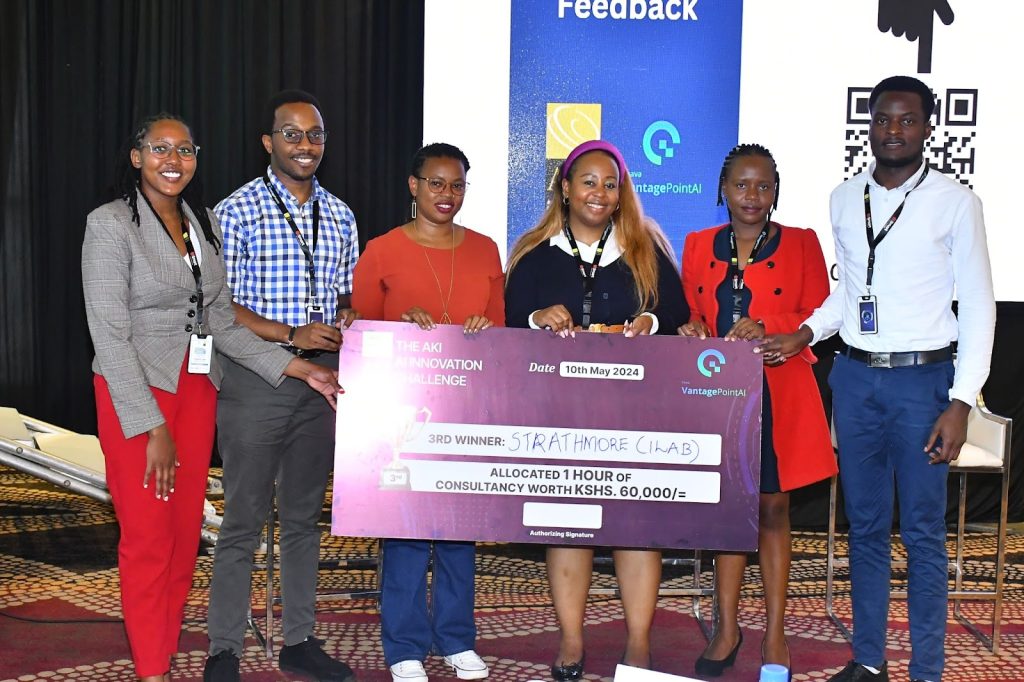
On the 29th of April, 2024 The Association of Kenya Insurers (AKI), in partnership with Caava VantagePoint AI (CVPAI), embarked on an Artificial Intelligence Innovation challenge for the insurance industry. @iLabAfrica, Strathmore University was represented by four research scholars at @iLabAfrica pursuing their Masters in Data Science and Analytics. Dubbed the Tunga team, the group comprised Lindah Kelida, Derrick Lubanga, Sharon Tonui, and David Nene. The team emerged 3rd overall in the challenge with a prize of 1 hour of consultancy worth KSH. 60,000.
1. Before we begin, Congratulations on your win. What was Tunga’s motivation to sign up for the hackathon?
We are currently experimenting with Artificial Intelligence and Machine Learning, as well as different AI communications and domains, so our motivating factor was to use this as an opportunity to explore what we can do in the Insurance sector, improve our skill set, and a chance to network with people in the industry. We wanted to give it our all because we knew we had the solution to the problem.
2. What was the project about and what strategy did the Tunga Team use to work together?
The project name is Tunga AKI Hackathon. We named it after our team and AKI Insurance.
Insurance companies spend valuable time trying to analyze large amounts of data and trying to turn this data into insights that enable them to make calculated decisions. Our solution was to create a chatbot that insurance companies can interact with by asking it prompts and questions and in return receiving recommendations about insights from the data. The chatbot is meant to minimize the time spent on data analysis by leveraging ChatGPT4 to demonstrate how quickly major stakeholders in insurance can receive insights and recommendations, which improves decision-making. The idea is to help you gather information from the data you have without filtering. For example, you can ask the chatbot ‘Which is the best-performing county?’ and it can go through your data and tell you that the best county was Turkana without doing any taxing labor.
Given the timeframe of the hackathon, which was five days, we wanted to ensure we fully maximized our teams’ efforts. We brainstormed the ideas and split the tasks based on our team members’ strengths. As for strategy, we shared ideas and split the tasks since the deadline was looming so Lindah and Sharon worked on reports and analysis. (Derrick explained) David and I worked on the chatbot and the user interface, the introduction part of the chatbox, and the web application. We had meetings and calls even late at night just to ensure everything was on point.
3. Did the Tunga team expect to make it to the finals? How did it feel when they announced the results and you were among the winners?
From a student perspective, we met our competitors who were already in the industry, which was quite intimidating, to say the least. At first, there were 19 entrants then they dropped to 5 applicants then they dropped down to 3, so as students becoming the top 3 from 19 entrants competing with industry experts was something we were happy about.
4. If you could alter the hackathon, what would you change?
We would change our presentation style and tactics. Our major mistake was focusing on the technicalities of how the chatbot worked so we spent time explaining how we leveraged ChatGPT and machine learning to bring the project to life. What we failed to notice is that the panel was more business-oriented than tech-oriented and they were more intrigued by the story behind the chatbot and the recommendations we gathered from the data.
We would also change how we engage with the audience and explain Artificial Intelligence and Machine Learning because we realized most people understand Artificial Intelligence as ChatGPT, but there is more than what meets the eye.
5. What challenges did the team face?
We faced a lot of sleepless nights because the deadline was fast approaching and there was still a lot to be done.
Another challenge was that as fascinating as Artificial Intelligence is, it is expensive and it requires a substantial investment to utilize it to its full potential. Luckily, we managed to find a solution.
6. What advice can you give to someone attending their first hackathon?
“Take it as a learning journey even if you don’t make it to the finals, with time you will improve your skills.’’ David encouraged, stating that this is an opportunity to meet people with similar interests who can mentor you and share many opportunities in terms of connections.
Hackathons are usually carried out in teams, the major advice would be to have an open mind, communicate clearly, and share ideas. “Don’t feel like these guys are smarter than me.” Derrick chuckled.
Delegate duties and work hard to meet your end and most importantly, have a positive attitude, believing that you are going to excel. It is more beneficial to take opportunities when they arise rather than letting them go because you are doubtful of your skills and talents.
Conclusion
All in all, the Tunga team’s tenacity, resilience, and determination served as an inspiration to techies everywhere, especially beginner hackers, showing that ‘as long as you show and do your best, then it doesn’t matter the obstacles in your way.’ They also showcased the brilliance of young minds and the untapped potential of Artificial Intelligence. Their only request was for potential investors who are keen on unlocking the power of AI to contribute to their projects and ideas.
By @iLabAfrica Research and Innovation Centre, Strathmore University.

Simply wish to say your article is as amazing The clearness in your post is just nice and i could assume youre an expert on this subject Well with your permission let me to grab your feed to keep updated with forthcoming post Thanks a million and please carry on the gratifying work
Thank you!